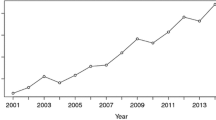Abstract
Bias/variance analysis [1] is a useful tool for investigating the performance of machine learning algorithms. Conventional analysis decomposes loss into errors due to aspects of the learning process with an underlying assumption that there is no variation in model predictions due to the inference process used for prediction. This assumption is often violated when collective inference models are used for classification of relational data.
In relational data, when there are dependencies among the class labels of related instances, the inferences about one object can be used to improve the inferences about other related objects. Collective inference techniques exploit these dependencies by jointly inferring the class labels in a test set. This approach can produce more accurate predictions than conditional inference for each instance independently, but it also introduces an additional source of error, both through the use of approximate inference algorithms and through variation in the availability of test set information. To date, the impact of inference error on relational model performance has not been investigated.
Similar content being viewed by others
References
Geman, S., Bienenstock, E., Doursat, R.: Neural networks and the bias/variance dilemma. Neural Computation 4, 1–58 (1992)
Neville, J., Jensen, D.: Dependency networks for relational data. In: Proceedings of the 4th IEEE International Conference on Data Mining, pp. 170–177 (2004)
Neville, J., Jensen, D.: Leveraging relational autocorrelation with latent group models. In: Proceedings of the 5th IEEE International Conference on Data Mining, pp. 322–329 (2005)
Neville, J., Jensen, D.: A bias-variance decomposition for collective inference models. Machine Learning Journal, under submission (invited)
Taskar, B., Abbeel, P., Koller, D.: Discriminative probabilistic models for relational data. In: Proceedings of the 18th Conference on Uncertainty in Artificial Intelligence, pp. 485–492 (2002)
Author information
Authors and Affiliations
Editor information
Rights and permissions
Copyright information
© 2008 Springer-Verlag Berlin Heidelberg
About this paper
Cite this paper
Neville, J., Jensen, D. (2008). Bias/Variance Analysis for Relational Domains. In: Blockeel, H., Ramon, J., Shavlik, J., Tadepalli, P. (eds) Inductive Logic Programming. ILP 2007. Lecture Notes in Computer Science(), vol 4894. Springer, Berlin, Heidelberg. https://doi.org/10.1007/978-3-540-78469-2_6
Download citation
DOI: https://doi.org/10.1007/978-3-540-78469-2_6
Publisher Name: Springer, Berlin, Heidelberg
Print ISBN: 978-3-540-78468-5
Online ISBN: 978-3-540-78469-2
eBook Packages: Computer ScienceComputer Science (R0)




